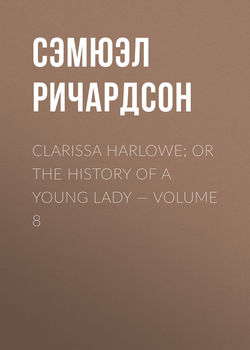Читать книгу Clarissa Harlowe; or the history of a young lady — Volume 8 - Сэмюэл Ричардсон - Страница 17
LETTER XVII
ОглавлениеMR. BELFORD, TO ROBERT LOVELACE, ESQ. WEDNESDAY MORN. 11 O'CLOCK.
I believe no man has two such servants as I have. Because I treat them with kindness, and do not lord it over my inferiors, and d—n and curse them by looks and words like Mowbray; or beat their teeth out like Lovelace; but cry, Pr'ythee, Harry, do this, and, Pr'ythee, Jonathan, do that; the fellows pursue their own devices, and regard nothing I say, but what falls in with these.
Here, this vile Harry, who might have brought your letter of yesterday in good time, came not in with it till past eleven at night (drunk, I suppose); and concluding that I was in bed, as he pretends (because he was told I sat up the preceding night) brought it not to me; and having overslept himself, just as I had sealed up my letter, in comes the villain with the forgotten one, shaking his ears, and looking as if he himself did not believe the excuses he was going to make. I questioned him about it, and heard his pitiful pleas; and though I never think it becomes a gentleman to treat people insolently who by their stations are humbled beneath his feet, yet could I not forbear to Lovelace and Mowbray him most cordially.
And this detaining Mowbray (who was ready to set out to you before) while I write a few lines upon it, the fierce fellow, who is impatient to exchange the company of a dying Belton for that of a too-lively Lovelace, affixed a supplement of curses upon the staring fellow, that was larger than my book—nor did I offer to take off the bear from such a mongrel, since, on this occasion, he deserved not of me the protection which every master owes to a good servant.
He has not done cursing him yet; for stalking about the court-yard with his boots on, (the poor fellow dressing his horse, and unable to get from him,) he is at him without mercy; and I will heighten his impatience, (since being just under the window where I am writing, he will not let me attend to my pen,) by telling you how he fills my ears as well as the fellow's, with his—Hay, Sir! And G—d d—n ye, Sir! And were ye my servant, ye dog ye! And must I stay here till the mid-day sun scorches me to a parchment, for such a mangy dog's drunken neglect?—Ye lie, Sirrah!—Ye lie, I tell you—[I hear the fellow's voice in an humble excusatory tone, though not articulately] Ye lie, ye dog!—I'd a good mind to thrust my whip down your drunken throat: d—n me, if I would not flay the skin from the back of such a rascal, if thou wert mine, and have dog's-skin gloves made of it, for thy brother scoundrels to wear in remembrance of thy abuses of such a master.
The poor horse suffers for this, I doubt not; for, What now! and, Stand still, and be d—d to ye, cries the fellow, with a kick, I suppose, which he better deserves himself; for these varlets, where they can, are Mowbrays and Lovelaces to man or beast; and not daring to answer him, is flaying the poor horse.
I hear the fellow is just escaped, the horse, (better curried than ordinary, I suppose, in half the usual time,) by his clanking shoes, and Mowbray's silence, letting me know, that I may now write on: and so, I will tell thee that, in the first place, (little as I, as well as you, regard dreams,) I would have thee lay thine to heart; for I could give thee such an interpretation of it, as would shock thee, perhaps; and if thou askest me for it, I will.
Mowbray calls to me from the court-yard, that 'tis a cursed hot day, and he shall be fried by riding in the noon of it: and that poor Belton longs to see me. So I will only add my earnest desire, that you will give over all thoughts of seeing the lady, if, when this comes to your hand, you have not seen her: and, that it would be kind, if you'd come, and, for the last time you will ever see your poor friend, share my concern for him; and, in him, see what, in a little time, will be your fate and mine, and that of Mowbray, Tourville, and the rest of us—For what are ten, fifteen, twenty, or thirty years, to look back to; in the longest of which periods forward we shall all perhaps be mingled with the dust from which we sprung?
